Saturday, January 28, 2006
A Girl called Kabbu
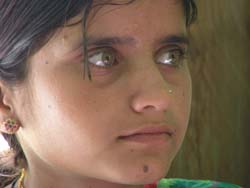
When you meet Kabbu, you cannot stop watching her eyes. When you look into them, you feel as if you are scuba diving. She is in eighth class. Her father and mother are labourers. She lives with her parents, five siblings and twelve goats in Haathma village. She has attended WCI’s comics workshops and we have prepared a comics poster based on her story. This particular poster is very popular. It tells the story of a girl who is married at a very young age and becomes a mother at a young age. She dies while giving birth to her child.
This story might become Kabbu’s own story. That is what she fears. There is no school in Haathma beyond eighth class. And while boys are sent to a school in a nearby village, her parents, like others, are not willing to send her to that school. Moreover, they are keen to marry her off next year. Because a girl who hapens to be a relative is getting married next year and marrying off Kabbu along with that girl would save a lot of expenses.
And Kabbu, she desperately wants to study further. You can see that desperation in her eyes. And in her stories.
We speak to Kabbu’s mother and try convincing her. She counts her difficulties and we offer her a measurement of Kabbu’s abilities. We tell her that Kabbu will be speaking in front of a huge gathering in Barmer. There is a gleam in her eyes while Kabbu scratches earth with her toe nail, her head held downwards. Kabbu’s mother promises us that she will make Kabbu study till tenth class.
Kabbu wants to be a doctor. She laughs while telling us this. She almost treats her dream like a joke. Because the reality is in front of her. Her friend Santosh stopped going to school after passing eighth class last year. She wanted to be a ‘Madam’.
We have to change that ‘reality’. Because it is high time dreams become a reality.
Jasai: From Darkness to Light
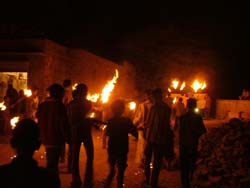
We reach Jasai when the sun is about to set. We hurriedly begin to click pictures. The children have been waiting for us. They have kept their roles ready. Someone has prepared a poem recital on Mahatma Gandhi. Meena has prepared a song and dance sequence. A little fat boy with chubby cheeks creates a beautiful rythm on his Dholak.
We ask everyone to assemble on the platform created around a Peepal Tree. In Jasai, Gulab is our pointsperson. He has been handling the campaign in his village. His father is the headmaster of the Government school in Haathma. Before we arrive, Gulab and his comrades have set the stage. The walls of the entire village are strewn with comics posters of the campaign. A shopkeeper has decorated the entire wall of his shop with posters. People are curious. They read the posters. Women watch the posters through their veils. Old men gaze at them through their thick glasses.
A number of people have assembled near the tree. Incuding an old man, who says he is a tailor. He also tells us that the American Government has sanctioned 410 crores for Jasai village. We almost believe him till we catch a whiff of his breath. He is high on country liquor.
We also run in various directions and try speaking to people who have not come to witness our gathering. We speak to them about our intention and our message. We give examples of Kalpana Chawla and Sania Mirza. Some give us a blank look. And some nod in agreement.
On the platform, Bittoo Bikewallah talks about his dreams. Children are shouting ‘Bike wala Bittu’. Girls, who have attended comics workshops earlier, talk about their experiences. They talk about how they identified issues pertaining to the Girl child and then prepared comics on them. People listen to them in apt attention.
A few men also address the crowd. They talk about the equality of boys and girls. They say it is equally important for girls to attain education.
It is dark by that time. The torches are ready. Torches made out of cloth shredding, tied on tree branches. They are ready, after being dipped in Kerosene oil. The young men of Jasai hold the burning torches and take out a procession. Children are singing:
Dariya ki kasam/ Maujon ki kasam/ ye taana baana badlega
Swear by the river/ swear by the waves/ this pattern will change
There is a line in the song which reads something like this:
Ye sab mardon ka kissa hai
This is all men’s doing
We can feel that while reciting this line, the girls feel shy. They stammer and stop. A song turns into a murmur. It will take time but surely, the pattern is changing. We celebrate the success at Gulab’s home. With Baajre ki Roti, topped with Desi Ghee and Jaggery.
Celebrating Comics Power in Haathma

They were waiting for us. The children of Jasai village.
We had reached Barmer a day earlier, on the morning of India’s Republic Day. After deliberations over various arrangments and after a sumptuous brunch of Poha and Bikaneri Namkeen, we went to meet a group of Journalists. A number of things had to be arranged. A local Journo promised to procure tents. Someone went to motivate a local troupe of singers to perform at stopovers during the Bike rally. And we were still looking for funds.
More prints of posters and stickers were required. Press releases were being prepared. Phones rang after every minute. And despite net connection being abysmal in Barmer, we managed to exchange few e-mails. Next morning we hired a Jeep driven by a grumpy driver and proceeded towards the Haathma village. Through Jasai village. Jasai, where children waited for us.
Near the village, we asked the driver to stop. We wanted to click a few pictures. Of the posters pasted on desolate walls. On water tanks. A railway track passed near Khadin. This is the place where the train will reach Munnabao. And then cross over to Pakistan. But things won’t change much for these villages.
While clicking pictures, shouts of ‘Comics Power Zindabad’ (Hail Comics Power) lent a feverish pitch to the air laden with dust. A bunch of school children wearing sky-blue uniform had come to know that we had arrived. With these children, World Comics India had earlier conducted few workshops. And that is where they had picked up the lingo. They shook hands with us. Once. Twice. Thrice.
These are the villages, where less than a dozen Television sets exist. The only channel which reaches this area is state-run Doordarshan.
In Haathma, people have assembled in a small room, which serves as a public library. People, mostly men, donning colourful turbans on their heads and gold tops in their ear lobes have come to listen to us. Listen to us talk about Aapni Dikri Ro Hak.
Ramesh is a student of Fifth class at the Government School Haathma. In the workshop, he had made a number of comics posters. He has recently seen a film on Television. He does not remember the name of the film, but remembers the heroine. Preity Zinta. Ramesh’s father has seen the posters made by him, but does not remember their content. That is what we intend to change. And honestly, people like Ramesh’s father are turning into a minority.
At the school, children have gathered to listen to us. We talk to them for a while, explaining to them the motive behind the campaign. And then we take out a rally with them. In a line of fours, they come out on the road, under the hot blazing sun. They are holding banners in their hands. Few are holding comics posters.
Slogans are raised in favour of girl child. Hearing the noise, men and women come out of their clusters. We distribute the camapign material among them. More and more people are coming. So much so that we have to ask for extra material kept in the vehicle.
After a quick bite of Parle-G biscuits and water, we meet Kabbu. More about her in the next post.
Sunday, January 08, 2006
And Finally, The Rally
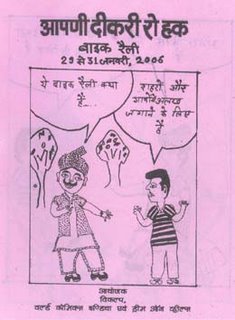 Finally, a Bike Rally. Yes, on 29th January, people will start pouring in from 21 Panchayat areas - in the Barmer district of Rajasthan. They will be coming on cycles, scooters, motorcycles and other mode of transport. Some will be even reaching after walking for miles.
Finally, a Bike Rally. Yes, on 29th January, people will start pouring in from 21 Panchayat areas - in the Barmer district of Rajasthan. They will be coming on cycles, scooters, motorcycles and other mode of transport. Some will be even reaching after walking for miles.On the morning of 30th January, we intend to take out a Bike Rally, led by International Bike racer Bittoo Sondhi. Many renowned residents of this area will be present to support our campaign. Through this rally, we intend to sensitise people over the declining girl child ratio.
The rally will make stop-overs at man places, where participants and other activists will hold various performances and initiate discussions with the local populace.
The rally will finally culminate at Jodhpur on 31st January.
By Them, For Them
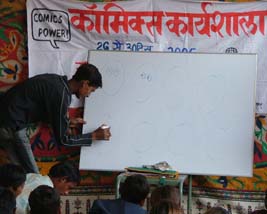 It has been a humbling experience, to work for this campaign. When we started, we just had a faint idea of how we intended to run this campaign. We met people and over a feast of tea and Rajasthani delicacies, the framework of this campaign began to crystallise.
It has been a humbling experience, to work for this campaign. When we started, we just had a faint idea of how we intended to run this campaign. We met people and over a feast of tea and Rajasthani delicacies, the framework of this campaign began to crystallise.The local people were excited about the idea. Little did they know, or for that matter us, that the local people would chart their own course; something that would prove to be a major change in their outlook. People pooled in ideas and we discussed them together. We organised a crash course in Comics-making and in no time, volunteers came out with Comics – one after another. A new thing was happening. The local people were preparing the campaign material for themselves.
 Using local characters, which wore traditional dresses and spoke their language, the activists made various comics on issues revolving around them and their society. Everything was familiar and we reaped the benefits of our efforts from Day 1. People came, saw these comics and understood what we were talking about. That is what we wanted.
Using local characters, which wore traditional dresses and spoke their language, the activists made various comics on issues revolving around them and their society. Everything was familiar and we reaped the benefits of our efforts from Day 1. People came, saw these comics and understood what we were talking about. That is what we wanted.Thursday, January 05, 2006
An Alternative and a Dream on Bike
Vikalp, in letter, means an alternative. In spirit also, it aims to offer an alternative to people in terms of a society free from gender bias; a society which is violence free and provides equal opportunity to every one.
Vikalp was formed by youths with a considerable experience in the fields of social organisation, leadership building and taking up issue-based work. Most of the members have been dealing with cooperative ventures, decentralization, sensitization, empowerment, sustainable development, gender equity etc.
The organisation’s mission is to integrate the voices of youth in the process of social development, augmenting their capacities and co-creating enabling opportunities for their meaningful participation.
Another partner of this campaign happens to be 'Dream on Wheels' (DOW). DOW is the brain child of I nternational Bike racer Bittoo Sondhi – popularly known as Bittoo Bikewallah. Bittoo’s own story is so inspiring that dreams start sailing in ether. His passion for Bikes cured him of a killer disease like Cancer. And that was just the beginning of his tryst with triumph. Over the years he has participated in over 58 major rallies like Great Desert Himalaya (GDH), Raid-de-Himalaya, South India Rally, Hot Weather Rally etc; always finishing in top 5 positions. Bittoo was also instrumental in starting the 'Bike for Peace' global rally in Chandigarh. He has also participated in Aman Yatra, held during Gujarat carnage.
nternational Bike racer Bittoo Sondhi – popularly known as Bittoo Bikewallah. Bittoo’s own story is so inspiring that dreams start sailing in ether. His passion for Bikes cured him of a killer disease like Cancer. And that was just the beginning of his tryst with triumph. Over the years he has participated in over 58 major rallies like Great Desert Himalaya (GDH), Raid-de-Himalaya, South India Rally, Hot Weather Rally etc; always finishing in top 5 positions. Bittoo was also instrumental in starting the 'Bike for Peace' global rally in Chandigarh. He has also participated in Aman Yatra, held during Gujarat carnage.
After motivating children and youth through his association with various organisations, he founded his own organisation Dream on Wheels.
DOW endeavors to restore people’s faith in their dreams and help them to realise their unfulfilled potential. It has initiated its work with humble beginnings by supporting a school for underprivileged children in South Delhi and has several plans in pipeline to help those people who face various hardships in life.
Vikalp was formed by youths with a considerable experience in the fields of social organisation, leadership building and taking up issue-based work. Most of the members have been dealing with cooperative ventures, decentralization, sensitization, empowerment, sustainable development, gender equity etc.
The organisation’s mission is to integrate the voices of youth in the process of social development, augmenting their capacities and co-creating enabling opportunities for their meaningful participation.
Another partner of this campaign happens to be 'Dream on Wheels' (DOW). DOW is the brain child of I
 nternational Bike racer Bittoo Sondhi – popularly known as Bittoo Bikewallah. Bittoo’s own story is so inspiring that dreams start sailing in ether. His passion for Bikes cured him of a killer disease like Cancer. And that was just the beginning of his tryst with triumph. Over the years he has participated in over 58 major rallies like Great Desert Himalaya (GDH), Raid-de-Himalaya, South India Rally, Hot Weather Rally etc; always finishing in top 5 positions. Bittoo was also instrumental in starting the 'Bike for Peace' global rally in Chandigarh. He has also participated in Aman Yatra, held during Gujarat carnage.
nternational Bike racer Bittoo Sondhi – popularly known as Bittoo Bikewallah. Bittoo’s own story is so inspiring that dreams start sailing in ether. His passion for Bikes cured him of a killer disease like Cancer. And that was just the beginning of his tryst with triumph. Over the years he has participated in over 58 major rallies like Great Desert Himalaya (GDH), Raid-de-Himalaya, South India Rally, Hot Weather Rally etc; always finishing in top 5 positions. Bittoo was also instrumental in starting the 'Bike for Peace' global rally in Chandigarh. He has also participated in Aman Yatra, held during Gujarat carnage.After motivating children and youth through his association with various organisations, he founded his own organisation Dream on Wheels.
DOW endeavors to restore people’s faith in their dreams and help them to realise their unfulfilled potential. It has initiated its work with humble beginnings by supporting a school for underprivileged children in South Delhi and has several plans in pipeline to help those people who face various hardships in life.
Wednesday, January 04, 2006
Our Drive, our Inspiration
During various discussions and brain storming sessions, one thing emerged very clear – if we want this campaign to succeed, it has to first start ticking like a clock in peoples’ mind. We remembered what Mahatma Gandhi had said years ago; something which we thought was very much relevant to what we were planning. He had talked about a movement being launched by not working along the periphery of the society, but after penetrating deep into it. He had also reflected upon the fact that villages were the true image of real India.
We decided to make these two observations of the Mahatma the pivot of our campaign. Three organisations came together to realise one dream – with equal quantum of passion and commitment.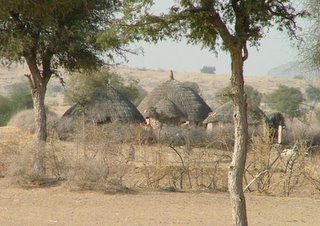
Vikalp happens to be a group of dedicated youth, who shifted from lake city of Udaipur to the sandy dunes of Barmer district, because they thought Barmer was the place where there was even more need of changing the lives of people. Situated along the border, life is a continuous struggle for its inhabitants. More so for the female gender that becomes a victim of bias and discrimination prevalent in the society. That is where help was required and with almost no monetary support, Vikalp plunged into action.
World Comics India has been conducting workshops in the remotest areas of India, training volunteers and grass-root activists in making Comics, which serves as a potent yet affordable medium of communication. The organisation got associated with the Barmer campaign as it felt that its experience and expertise was much required. In no time, it conducted workshops in the district, where children and youth were trained in the art of making comics – based on issues that mattered to them. This was probably happening for the first time in the history of any campaign that the publicity material for the campaign was generated locally, by the people, at whom this campaign was targetted. There were absolutely no funds at disposal. But when things are supposed to be done, then nothing should come in between. And that is what happened. Using the cheap, black and white format, Comics booklets and posters were prepared and then photocopied.
Then came Dream on Wheels. People have dreams but more than often they don’t know how to realise them. That is where Dream on Wheels comes into picture as an organisation and helps people achieve what they have been only imagining. This dream in particular; the dream of ensuring a bright future for the girl child is the collective dream of these three organisations, which they are hell bent on realising. And realise they will!
We decided to make these two observations of the Mahatma the pivot of our campaign. Three organisations came together to realise one dream – with equal quantum of passion and commitment.

Vikalp happens to be a group of dedicated youth, who shifted from lake city of Udaipur to the sandy dunes of Barmer district, because they thought Barmer was the place where there was even more need of changing the lives of people. Situated along the border, life is a continuous struggle for its inhabitants. More so for the female gender that becomes a victim of bias and discrimination prevalent in the society. That is where help was required and with almost no monetary support, Vikalp plunged into action.
World Comics India has been conducting workshops in the remotest areas of India, training volunteers and grass-root activists in making Comics, which serves as a potent yet affordable medium of communication. The organisation got associated with the Barmer campaign as it felt that its experience and expertise was much required. In no time, it conducted workshops in the district, where children and youth were trained in the art of making comics – based on issues that mattered to them. This was probably happening for the first time in the history of any campaign that the publicity material for the campaign was generated locally, by the people, at whom this campaign was targetted. There were absolutely no funds at disposal. But when things are supposed to be done, then nothing should come in between. And that is what happened. Using the cheap, black and white format, Comics booklets and posters were prepared and then photocopied.
Then came Dream on Wheels. People have dreams but more than often they don’t know how to realise them. That is where Dream on Wheels comes into picture as an organisation and helps people achieve what they have been only imagining. This dream in particular; the dream of ensuring a bright future for the girl child is the collective dream of these three organisations, which they are hell bent on realising. And realise they will!
Tuesday, January 03, 2006
Partners in Campaign

Vikalp - an organisation based in Rajasthan started the 'Save Girl Child' campaign in an informal way in 2003. The idea was to create awareness on this issue in the state, particularly in Western Rajasthan. Many activities took place in this regard in the last two years. Local youth were made a part of this campaign. Through various meetings and discussions with them, the message could reach other people as well. This initiative later took the shape of a public campaign.
This was the time when Delhi-based World Comics India joined the campaign. For years, World Comics India has been working at using Comics as an alternate medium of communication. The time had come to use the same expertise in rendering a new momentum to the campaign. After training the local children and youth, a set of comics, to be used as campaign material, was prepared.
During this time only, another dimension was added to the campaign. All of us were of the opinion that no campaign succeeds until it reaches out to people. That is how rallies began. People, who had turned into activists now, spread the idea - travelling by foot, cycles and motorcycles - to Dhaanis (residential clusters), to villages and then to city. To strengthen the campaign further, International Bike racer Bittoo Bikewallah also pooled in this year, through his organisation 'Dream on Wheels'.
Well begun is half done. And how we agree!
The Seed of Campaign
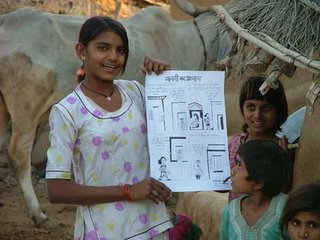
With the onset of the 21st century, it is becoming increasingly clear, with the facts and figures generated from research, that the half population of this world is diminishing into a quarter. We are pointing our finger towards the female population, which is decreasing throughout the world. This has been attributed to reasons like: Male chauvinism, suppression of women, Girl foeticide, infanticide, sexual exploitation, menace of dowry, strikingly unfavourable marriages, illiteracy etc etc.
We are racing against time, but we can still salvage the situation, if we act now. Tomorrow might be late. That is why we are of the opinion that in order to chisel out a campaign for the rights of a girl child and highlight the inequality between men and women, a multi-dimensional strategy is the need of the hour.
Aapni Dikri Ro Hak (Give your daughter her rights) is one step - or let us dare to call it a leap - towards this goal. And this campaign takes wings, deriving its strength from the desert winds of Rajasthan.
Subscribe to Posts [Atom]